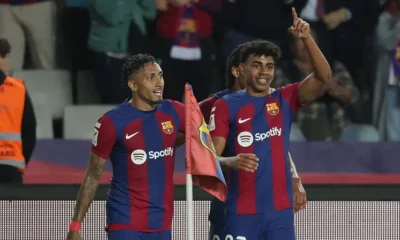Some at Barcelona had been eagerly anticipating Joao Felix’s move all summer. The positionless Portuguese talent made it clear in a landmark interview in July that he wanted to leave Atletico Madrid, telling – of all people – transfer guru and social media influencer Fabrizio Romano of his intention to play for Barca.
And although the Blaugrana were both broke and sceptical, they forced the deal through on deadline day, circulating a dramatic press release that included a young Felix, sitting on a ball, talking to a version of his younger self, presumably revealing that a dream came true.
But at some point, the football side has to kick in. And Felix’s career has been defined by its inconsistency, an immense talent enjoying moments of undeniable class, followed by long stretches of underperformance – especially for a player who was so good as a teenager.
Barca was supposed to be another new chance. Instead, he has endured the same troubles that have followed him for four years. And now, facing his parent club – in the shirt of his current employers – Felix once again looks like an expensive talent failing to live up to expectations.

Why Barcelona?
If reports are to be believed, Xavi didn’t really want Felix. The manager’s priorities lay elsewhere, with the Blaugrana needing a Sergio Busquets replacement, a right-back, and an extra attacking player. Xavi wanted to hold on to Ez Abde – later sold to Real Betis at a cut price – and bring in another, more hardworking attacking midfielder. Lionel Messi was, of course, a priority. But when he went to Inter Miami, it became clear that the Barca’s options were dwindling.
Club president Joan Laporta, a long-time Felix fan, pushed for his arrival, and, buoyed by a good relationship with Jorge Mendes, effectively had the deal sorted. Xavi was sceptical. Felix’s creativity couldn’t be denied, but the manager feared that the Portuguese’s poor work rate would make him an imperfect fit in his preferred system.
Still, Xavi, realising he had nowhere else to turn, gave in, and Barca got the deal over the line with minutes to spare. They were agreeable terms for Laporta and co. Atletico needed to get rid of the player at pretty much any cost – such was his unpopularity in the Spanish capital. Barca couldn’t afford to buy him outright but sealed a season-long loan with no formal option to make the deal permanent. Felix, in return, took a substantial pay cut, ensuring that his dream move could happen.

A strong start
After finding the net just once in his first three games of the campaign, Robert Lewandowski took to the press to complain about his manager’s tactics.
“Sometimes we don’t play with enough attacking players, I don’t have support. So I look for the best solution for the team. In many games, I don’t have many chances to score. In the last two games, I didn’t have many chances, I didn’t receive many balls, so sometimes I had to create my chances,” the Polish striker lamented.
His criticisms were fair. Although the Blaugrana had scored four in their previous contest, Lewandowski himself was left starved of opportunities. Enter Felix.
He scored on his maiden start for Barca, bagged a brace in his second game, and tallied two assists. After four appearances, he had five goal contributions to his name, pacing Barca to a win in each of his showings. Lewandowski, simultaneously, hit a rich vein of form after making a slow start of his own. Everything seemed well in Catalunya.

The bits in between
A Real Madrid legend was the first sceptic. On September 18, after Felix had turned in a magnificent hour against Betis, Guti appeared on Spanish television, and halted the hype.
“Sixty minutes aren’t worth it to me. He has to have a spectacular year,” he claimed.
And the former Madrid midfielder was right. Since then, Felix has struggled for consistency. He has still been on the ball a lot, but those goals and assists that defined his first two weeks in Catalunya have dried up. He went 13 games without scoring, and has just seven goal contributions this year.
For long stretches, he has looked every bit the same immensely talented yet ineffective entity of the past few years. Call it another false dawn.
Felix has been saved, perhaps, by the fact that his side have more pressing concerns elsewhere. An injury crisis ravaged the Blaugrana for much of October, and most of the attention around the club was focused on how they might make up for the losses of Lewandowski, Raphinha, Frenkie de Jong and Pedri. Felix was fit enough to be on the pitch – something that couldn’t be said for half of his colleagues.
Joao Felix has always been a hard player to quantify. He doesn’t operate in stats as much as moments. There are few legitimate ways to numerically explain the drop of the shoulder, or the shimmy past a defender. Still, if this is a numbers-based game – and Barca do need him to score and assist – then Felix has dropped off. That streak without finding the net may have made headlines, but his lack of assists over that period is perhaps more cause for concern. He tallied one in 13 games, while his inconsistent shot-creating action numbers – as high as five, and as low as zero – don’t show a player who was a supreme creative force.
But Barca aren’t the first team to struggle here. There is, indeed, a pattern about Felix’s career. A new season comes, as does a fast start – a few goals here, a highlight-reel assist there. The hype grows, the storylines are written. And then comes the regression, the weeks of mediocrity, before the cycle begins again.
Part of the issue is that he is so hard to define as a player. Felix has always been a positionless entity. He isn’t exactly a No.10, and he is certainly not a winger. Confine him to one space, or limit him to one area – as Xavi has done – and you lose the floaty things he excels at. The Portuguese national team have arguably got the best version of Felix over the last year. Roberto Martinez allows his players to roam, link up in space, and effectively revolve around the rigid Cristiano Ronaldo. Let Felix do that, and he could be world class – something he showed at times in the World Cup.
The issue remains, of course, that few managers at elite level football would do such a thing. Jurgen Klopp’s defensive needs are too pronounced. Pep Guardiola has already shackled one great roaming talent in Jack Grealish. Perhaps Carlo Ancelotti is the only manager who allows such freedom – but even he has very specific demands at the other end of the pitch (and Bellingham is already his focal point).
Perhaps, then, it falls on the player to agree to be adaptable. It’s something that Diego Simeone alluded to on numerous occasions: “As well as talent you need to have commitment,” he said. “When a player realises why he is playing for Atletico then everything comes together.”
‘El Cholo’ might have been right.
Source Goal.com












